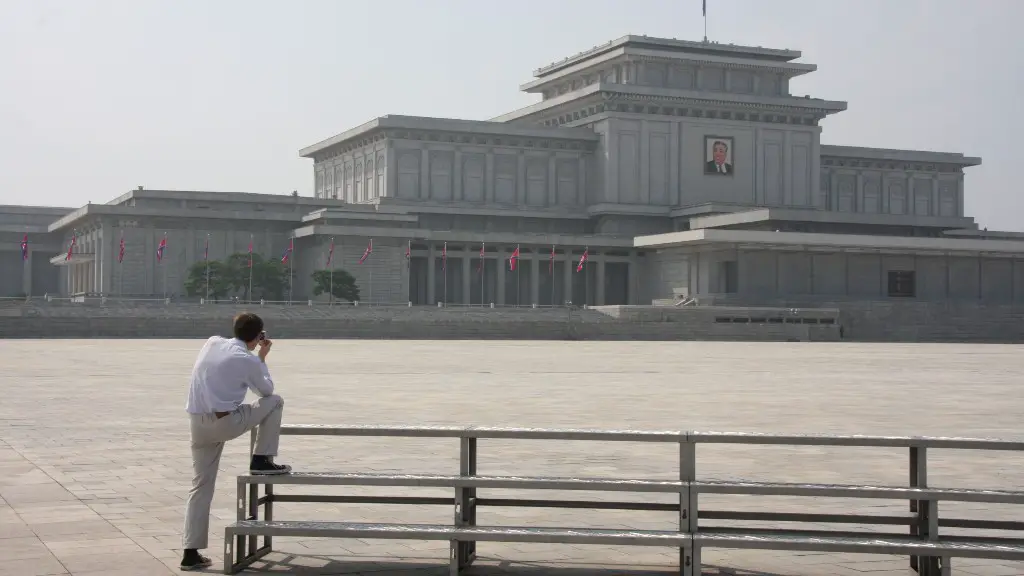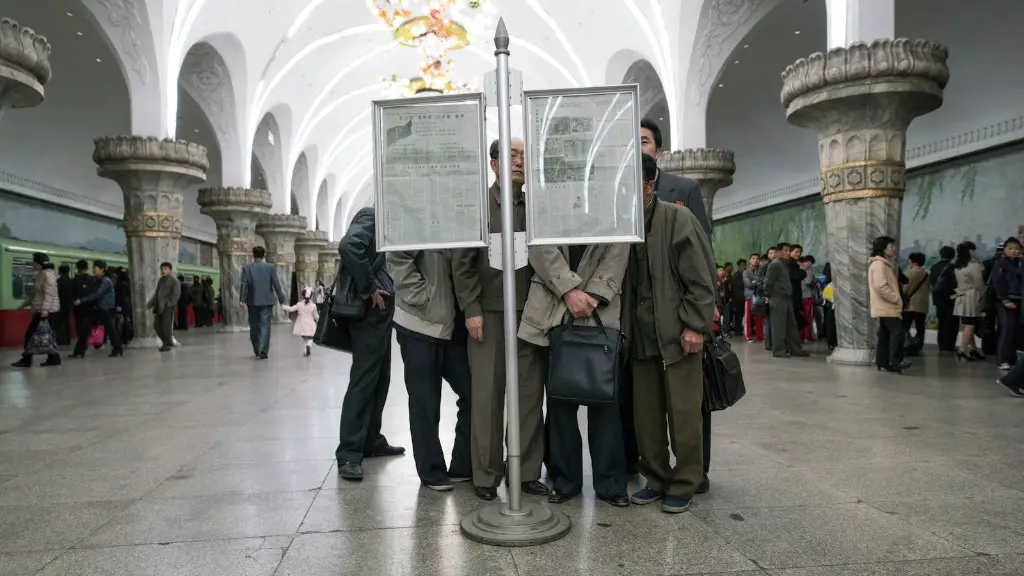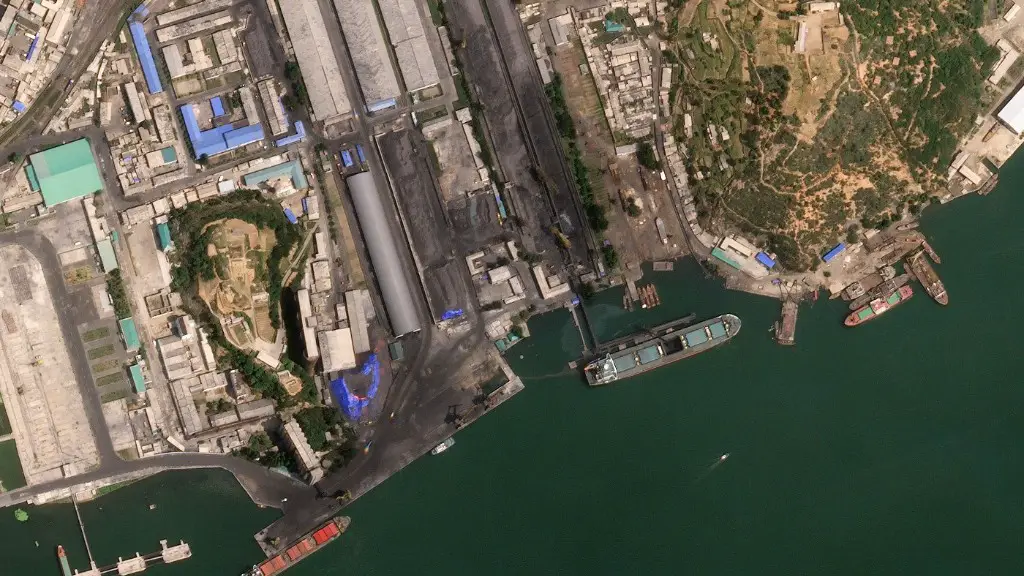Background Information
For years, North Korea has been seen as a potential threat to the United States and its allies. The isolated nation’s pursuit of advanced nuclear weapons and long-range missile capabilities has stoked fears that it could use them to launch an attack, including one on the United States. Pyongyang has tested several intercontinental ballistic missiles (ICBMs) in recent years, and while they have not been specifically designed to carry nuclear warheads, their range makes them capable of carrying them. With this in mind, the question of whether North Korea could bomb the United States is one that has been on the minds of many.
Relevant Data
As of 2019, North Korea is estimated to have between 15-60 nuclear warheads at its disposal, according to the Bulletin of Atomic Scientists. It is believed that North Korea has stockpiled enough uranium for an estimated 40-60 additional warheads. Additionally, North Korea has conducted six nuclear tests since its first test in 2006, the last being a hydrogen bomb test in 2017.
In terms of long-range missile capability, North Korea has conducted a total of 23 missile tests since 2012. It tested its longest-range ICBM, the Hwasong-14, in July 2017. The missile has an estimated range of 10,000 km, which is far enough to cover most of the United States.
Experts Perspectives
Experts have expressed grave concern over North Korea’s nuclear capabilities. Admiral Samuel J. Locklear, former commander of U.S. Pacific Command, believes that North Korea would need to develop more sophisticated missile guidance systems for its warheads to reach the United States, but that it could eventually succeed in doing so.
In addition, U.S. Army Lieutenant General Jan C. Broderick has warned that North Korea’s nuclear and missile capabilities “constitute a clear, present and growing threat to the world”. He believes that North Korea “seems intent on developing technological capabilities that could eventually threaten U.S. interests”.
Analysis of the Threat
The threat posed by North Korea’s nuclear and missile capabilities should not be taken lightly. Its nuclear weapons and long-range missiles are designed to target Japan, South Korea and the United States, and it has already sought to increase its capabilities.
The threat of a nuclear attack is especially concerning, as a nuclear detonation on American soil could have devastating consequences. The U.S. is also vulnerable to attacks from short-, medium- and intermediate-range missiles, though the United States is protected from long-range missiles by its missile defense system, THAAD.
Experts Solutions
Experts have proposed several solutions for dealing with the North Korean threat, including further diplomatic and economic sanctions, military action, and even direct talks with Pyongyang. Each of these approaches has its pros and cons and, ultimately, the best course of action will depend on the specifics of the situation.
Admiral Locklear has suggested that the United States should continue to focus on diplomatic and economic sanctions, believing that these are the most effective way to keep the North Korean government in check.
U.S. Army Lieutenant General Broderick believes the United States should open a dialogue with Pyongyang in order to reach a peaceful resolution to the situation. He argues that “dialogue is absolutely necessary to avert a disastrous outcome”, and that direct talks could lead to a diplomatic breakthrough.
Own Analysis
North Korea has become an increasingly serious threat in recent years due to its continued pursuit of nuclear weapons and long-range missiles. It is clear that the United States needs to take action to address this threat, but the options for doing so are limited.
Sanctions, military action, and dialogue are all on the table. Sanctions are likely the most effective option, but will take time to have an effect. Military action could have unforeseen consequences and could lead to an escalation of the situation. Dialogue, on the other hand, offers the potential for a diplomatic solution, although there are no guarantees that North Korea will agree to talks or abide by any agreements that may be reached.
Economic Impact
The threat posed by North Korea has had a significant economic impact both in the United States and around the world. Countries in East and Southeast Asia have been particularly affected, as they are the closest to North Korea and thus the most vulnerable to a missile attack.
In the United States, the stock market has seen its ups and downs as investors weigh the risk of a potential missile attack. In addition, the economic sanctions imposed by the United States and other countries have had a negative effect on North Korea’s economy, leading Pyongyang to look for ways to skirt the sanctions, such as through money laundering and cybercrime.
Proposed Solutions
Given the complexity of the situation, no single solution is likely to solve the problem. Instead, experts believe a comprehensive approach is the best way forward. This could include a combination of diplomatic talks, economic sanctions, and even military action, if necessary.
The United States has already been pursuing a mix of these tactics, but there is still room for improvement. For example, increased dialogue between the U.S. and North Korea could be beneficial, as could continued support for the UN-mandated sanctions against Pyongyang. In addition, improved intelligence capabilities and missile defenses could be critical in dealing with North Korea.
International Perspective
The international community has also been involved in dealing with the North Korean threat. China and Russia have both been active in the Six-Party Talks to resolve the situation, while other countries, such as South Korea and Japan, have sought to increase their military capabilities in anticipation of a possible attack.
The United Nations Security Council (UNSC) has also passed a series of resolutions aimed at curbing North Korea’s nuclear and missile capabilities, although Pyongyang has so far ignored them. The UNSC has even imposed an oil embargo on North Korea as a means of pressuring the regime to return to negotiations.
Current Status
At present, North Korea’s nuclear and missile capabilities remain a serious concern, but it is not clear whether the regime has the intention or capability to launch an attack on the United States. The United States continues to maintain a strong defense against any potential missile attack and is working to find a peaceful resolution to the situation.
In the meantime, analysts monitor North Korean activities closely and work to interpret the regime’s intentions. Countries around the world will continue to develop and deploy weapons and defenses to minimize the threat of a missile attack, while also looking for ways to bring the regime back to negotiations.


